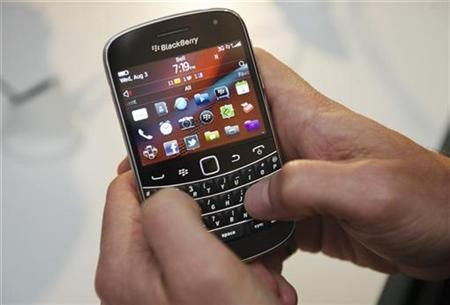Five Reasons RIM, BlackBerry Will Die
ANALYSIS

The BlackBerry smartphone phone was a big deal, at one time. But that was a long time ago, in tech terms. It was before 2007, when Apple launched its first iPhone. Now, as Apple nears launch of its iPhone 5, the BlackBerry and Research in Motion, the smartphone's manufacturer, are both on a fast track to demise.
Here are five reasons will RIM and its BlackBerry smartphones will die:
1. Losing Marketshare Too Fast to Recover
Research in Motion's share price -- down almost 20 percent on Friday, to $23.66, well off its 52-week high of $70.54 -- isn't the only thing falling for the consumer tech company. The company's signature product, the BlackBerry smartphone, is losing ground about as fast.
Despite efforts to revive its BlackBerry lineup, RIM sold fewer handsets than analysts expected in the last quarter, as it can't keep up with rapid adoption within the industry and by consumers for Google-powered Android smartphones and Apple's iPhone. RIM had hoped its new PlayBook tablet might spark interest, helping bolster BlackBerry phones as well, but that effort isn't working either.
One analyst says RIM's disappointing PlayBook launch has compromised RIM's ability to develop a mobile ecosytem with long-term profitability. Meanwhile, Android will benefit from Google's Motorola Mobility acquistion and Apple will leapfrog its massive success with the iPhone 5 -- leaving little room for the shrinking BlackBerry and RIM.
2. Little Cross-Selling Push
Consider that buyers of a BlackBerry can't go to the store and buy an easy-to-use personal computer they can plug in and quickly have all their devices interface seamlessly. But that's the way it works with Apple. Many are underestimating how much market share this company is going to take for that fact alone.
Many consumers didn't join the Mac desktop and laptop computer realm all these years, sticking with PCs. But darn it for Research in Motion, that's all changing now. Grandmothers who got iPads for Christmas and an iPhone for their birthday are suddenly deciding they may need a Mac after all.
RIM needed its PlayBook tablet to be a mass consumer success to have a shot at getting into that game, and it's all but flopped against high expectations -- selling about 200,000 units.
For RIM, this cross-selling game is all but over. The company has only its products to push with little cross connectivity appeal, and very little sexy beyond that. In this tech world, it's fast becoming one-play, all-play -- meaning the winner takes all (the products).
3. Clumsy Product/Too Few Apps
Research in Motion is working hard to get its latest, greatest updated BlackBerry products out, but consumers reveal that once they get iPhones and Androids in hand that the BlackBerry by comparison is like the metal wheel was up against the best Michelin tire one can buy. It's a bit dated.
Most BlackBerry users can tell of calling so many people they didn't mean to call from accidental auto dials. The screen is too small, and the buttons aren't even always in the same place from one model to the next.
The product served its purpose for a while, but only until the next generation of smartphones -- read: Apple and Google -- came along to deliver one harsh, deadly blow. The consumer doesn't have much patience these days, and once a product shows its too far behind the times, well, it is.
The faster the BlackBerry and RIM fall, the faster software developers who create apps pull away. RIM proudly proclaims the company has 35,000 apps available in its online store, but consumers can find more than 200,000 apps in the Android Market and 425,000 apps in Apple's App Store.
4. Discount Pricing Won't Help
Arguments have been made that RIM can remain a player in the smartphones business based on its current customer base by competitively pricing its products in the future below Apple's iPhone and Google's Android.
But already Apple is showing it will get into the low-priced smartphones model market as early as this year, as the company is rumored to release a down-market iPhone 4 that is simpler and cheaper, but with enhanced voice application.
We saw when HP first dropped the price by $100 on its new TouchPad that customers still didn't come running. In fact, it took a $99 fire sale to get the product moving. Lower pricing doesn't help much, and Apple's iPhone is selling all over the world despite a price tag of $500 and up.
5. Not an Attractive Takeover Candidate
Finally, RIM will eventually wither away because of the company's girth -- which some seem to think will serve as a hedge of safety against the future -- is in fact a great liability.
The company is big based upon being yesterday's hot thing. When technology wins out in a fast-moving technology world like this, as Apple's and Google's are doing right this very second, being hot the day before means nothing. In fact, being bigger then becomes a liability, meaning more bureaucracy in place to stifle nimbleness needed to readjust quickly to changing conditions.
The company is in the midst of cutting jobs, but when you think of RIM, think of Palm. Many thought HP was crazy for buying Palm, at one time a leader in the same way RIM was recently a leader. HP paid $1.2 billion for Palm's WebOS system. They had big plans for it, too.
But just seven weeks after launching the TouchPad tablet on the WebOS system, HP said it's walking away from the product, and would also no longer support WebOS.
Oops.
That little blunder shows how fast a once-hot tech company can lose all value. Apple is the leader, by far, and until RIM can make an actual dent in Apple's gain, the company will have little value to potential buyers.
© Copyright IBTimes 2024. All rights reserved.





















